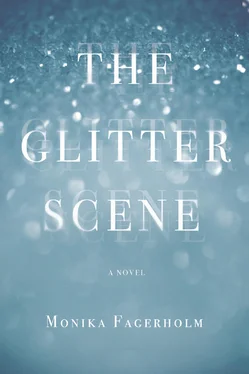Which, according to Maj-Gun, is important because they are supposed to be celebrating something. “That everything is over now,” she says and not just that it is over but that they have made it out of “all of that” with “lives and youth intact”—that is Maj-Gun’s own illustrious wording too, her emphasis on “youth” as well. Susette, for her part, does not say very much; in and of itself Maj-Gun is of course the one who talks the hind leg off a donkey the most even during that time but also because it actually is not necessary to talk because the house where they have been living together for a while is for sale and a reasonable offer has been made that Susette and her brothers, who are beneficiaries of the estate after their parents, have accepted and Susette herself has rather quietly placed a down payment on an apartment in the apartment complex above the town center and only when it is done does she tell Maj-Gun that she will need to look around for somewhere else to live. “You have to move, you’ll certainly find something.”
“But where am I supposed to go then?” Maj-Gun says, rapidly, unexpectedly pours out of her there where she has been standing in front of Susette in the kitchen, complete surprise on her face, almost on the verge of tears. Before Susette has time to repeat that Maj-Gun will certainly quickly find a better, not to mention more agreeable, room to rent, Maj-Gun’s mood changes and she excitedly starts planning the farewell festivities that will take place as soon as the “moving work” as she calls it in that moment is “taken care of”—and these festivities will in other words, as said, be crowned with a visit to the movies. “As if,” Maj-Gun says, “welcome back, in other words. The scissors on the shelf: TO youth, life, an invitation.”
When they get inside the movie theater that predetermined evening it is, in other words, empty; a long long time passes during the minutes before the film starts and no one is there. “Aside from the usual jack offs of course, typical,” which Maj-Gun loudly and expertly but with an awkwardly audible relief in her voice whispers to Susette as she is sitting there, squirming restlessly and glancing around furtively and then finally catching sight of some occasional losers of the male sex who trickle into the theater before the lights dim and the merciful darkness sinks and the movie at last gets started.
The film is called Skateboarding and is about a boys’ gang in a run-down big city suburb in America, one of those against-all-odds-gangs united by its great passion for skateboarding and a lot of youthful complications along the way to the happy ending that is their own skateboarding ramp behind the apartment buildings and shaking hands with the mayor.
Not a film to write home about, in other words, and no one other than Maj-Gun and Susette stuck it out until the end. But still, unforgettable. Susette will always remember the feeling of liberation on the bus on the way back home to the District.
That it was over now, whatever that was: Mom, the Pole, all the rest… Does not even need to be mentioned in detail any longer— AND Majjunn .
Like a wave that is receding. And the feeling is her own, private. Absolutely indivisible, much less with Maj-Gun Maalamaa. Because that is also what the liberation was about, a small decisive insight: they had not meant the same thing when, before the visit to the movies, Maj-Gun said that they were going to “celebrate” having gotten past “it.”
On the one hand: yes, it was over. On the other hand: for Susette it means, has meant something else, something more—beyond Maj-Gun too, all of that.
But: “Skateboarding, to life, then?” It is almost like she is standing there saying it herself, Maj-Gun in the rain after the movie, at a loss outside the movie theater, alone on a rain-covered asphalt road where she suddenly, for a few seconds, just stands and dies. Maj-Gun who is wearing what she calls “going-out clothes” for the disco under her coat but Susette who just says, “I’m going home now,” and leaves.
Starts walking, rapid steps in the direction of the bus station for the provincial buses. Maj-Gun who trots after her, at a proper distance of course, maybe thirty feet, in silence. Without calling out, without trying to catch Susette’s attention at all.
Is just there, behind her.
And on the bus, Susette, got on before Maj-Gun, takes a seat at the very front, in a row for just one person and Maj-Gun walks past her to the very back without looking in Susette’s direction. During the journey Susette gets up anyway and goes and sits next to Maj-Gun in the last row and they travel on in silence and when she and Maj-Gun go their separate ways at the bus stop at the square in the town center Susette understands that she and Maj-Gun will no longer be together as friends, or at all, for that matter. And it hits her too when she wanders home to her own, new apartment that she has not asked Maj-Gun where she has moved.
But she takes a shortcut through the cemetery that night.
•
And suddenly, there, she gets an impulse and turns off in the rain over to the new side of the cemetery, a few hundred feet away from the path where her mother is buried next to her father, even though her mother had said many times after her father’s death, while Susette was still living with her mother, that she and father should “rest” on the old side where it was much more peaceful.
Her mother had thought that the new side was so deserted. Not much in the way of trees or leafiness yet either, from what Susette can make out in the darkness. But fuller now, though certainly none of the vegetation that provides a cemetery feeling of life and death, the passage of time—not seconds, days, but centuries, decades, “generations follow in the footsteps of generations,” as her mother sang toward the end when they still went to church often, she and Susette, in black clothes, “from a house of sorrow,” crowed loudly, her mother with a false and frail singing voice which, if you were not careful, was embarrassing; old silence, dignity.
But still, despite everything anyway, here now as well. Such a calm, at the cemetery, under a bright red umbrella in the pouring rain.
And in the midst of everything, all of that exhaustion that had been inside her, or whatever it is, had been, as if she could finally think, just herself, Susette.
“… It only took a few minutes. I called the ambulance.” Maj-Gun who had stood and said that in the house then, at the very beginning—and how Susette had lost her balance, had pain in her stomach. Maj-Gun’s hand on her shoulder, but the tenderness in her grip too, which had held her. But still: no future—the feeling she had sometimes with Maj-Gun in the house, that they were two children playing while waiting for the mother to return.
When the mother would not be returning.
When she came from “Poland” her mother was dead. “Poland,” she had not been there of course, it was just a designation. But it was not a secret or important, in and of itself. In contrast to what Maj-Gun had insinuated at the ferry terminal where she had met Susette, when she asked about the backpack. “Fjällräven, is it new?”
A long time, somewhere else. Did not come home. Did not keep in touch with her mother in the house in the town center on a regular basis. Cannot say exactly why, not even in hindsight.
And what has she been up to? Working in different places. Home help, care for the elderly, reading out loud for an old lady. Quite a lot of the type of work she had already done in the District—at the private nursing home for the elderly and infirm where she started working after finishing high school, before selling ice cream, and the strawberry fields.
Читать дальше











